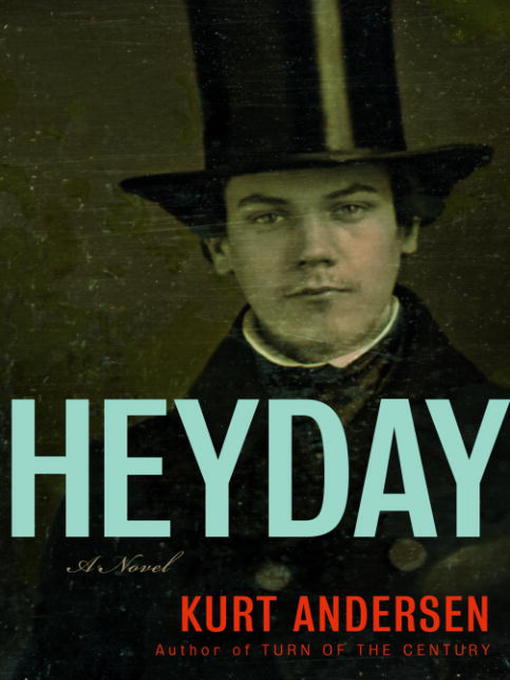
Heyday
A Novel
کتاب های مرتبط
- اطلاعات
- نقد و بررسی
- دیدگاه کاربران
نقد و بررسی

Starred review from January 8, 2007
This historical novel may surprise readers who know Kurt Andersen as the cofounder of Spy
magazine and the author of the wise and acerbic Turn of the Century
(1999). It's set in the mid–19th century, for one thing, and not—at least not ostensibly—about media or celebrity. Benjamin Knowles is a young Englishman infatuated with all things American, including and especially the part-time actress/part-time prostitute Polly Lucking, whom he meets on his first passage to New York. Just as Knowles and Polly are about to go public with their love, Knowles does that boy-thing—i.e., says something stupid—and she flees New York. It's worth getting through the slowish beginning to arrive at the delightful, intelligent last two-thirds of this long novel when Knowles teams up with Polly's damaged brother, Duff, and family friend, Timothy Scaggs, a journalist of sorts, in a trek west in search of the freethinking Ms. Lucking, with a murderer just behind them (it's a subplot). Andersen's second novel is more than just a love story or a history lesson (though there are details included that make it clear how much research Andersen did); it's a true novel of ideas. The group visits a 19th-century health farm/cult, for example. The occasional historical figure—e.g., Charles Darwin—makes an appearance as well. There are shades of T.C. Boyle's The Road to Wellville
, as well as aspirations toward E.L. Doctorow. But in the end, this second novel belongs to Andersen, a tale of bright, rambunctious, aspiring young people. Like them, the book is rowdy, knowing—and wholly American.

Starred review from January 1, 2007
In this utterly engaging novel, the author of "Turn of the Century" brings 19th-century America vividly to life, but first he takes us to revolutionary Paris. There, as a bystander, young English gentleman Benjamin Knowles inadvertently causes the death of a policeman. The policeman's enraged older brother swears vengeance and follows Ben to England. But Ben has already given in to a childhood dream and headed to America, where he is charmed by the boisterous young republic. He's also charmed by Polly Lucking, an actress and prostitute he spots across a crowded room, and he meets her after he's fallen in with a radical, wise-cracking journalist named Skaggs. Polly's brother, Duff, is a troubled veteran of the campaign against Mexicoa good Catholic boy, he ended up fighting on the "other" sideand a stealthy arsonist. Ben and Polly fall in love, but after a misunderstanding Polly heads west with her protégé, Priscilla, and the three men track her downall the way to Gold Rush California. Meanwhile, Ben's would-be assassin tiptoes behind. While this is a long book, it moves quickly, with historical detail that's involving but never a drag on the action; the characters are beautifully drawn. A terrific book; highly recommended. [See Prepub Alert, "LJ" 11/1/06.]Barbara Hoffert, Library Journal
Copyright 2007 Library Journal, LLC Used with permission.

January 1, 2007
In 1848, young English aristocrat Benjamin Knowles, inspired by the regime change he witnessed in France, immigrates to America in search of "vulgarity and strangeness," enlightened attitudes, and democracy in action. He finds them all in Manhattan's infamous Bowery district. Ben falls in immediately with three misfits: Timothy Skaggs, alcoholic journalist and photographer; Duff Lucking, troubled firefighter and arsonist; and Duff's sister, Polly, actress and part-time hooker. Ben's tumultuous affair with Polly--and the promise of greater freedom--drives the group's journey westward, where California's gold fields await; meanwhile, a crazed French official crosses the ocean to take revenge against Ben. Andersen's satirical wit is well evident, but he plays fair, offering scenarios to offend nearly everyone. In the tradition of the old-fashioned epic, " Heyday" presents amazing coincidences, lengthy digressions, and myriad descriptions of mores and vices. Although the amount of irrelevant historical detail overwhelms the plot, this overstuffed parody of a Victorian novel makes some serious points: it succeeds in exposing the peculiarities and ridiculousness of nineteenth-century society--and contemporary reverence for it.(Reprinted with permission of Booklist, copyright 2007, American Library Association.)

























دیدگاه کاربران